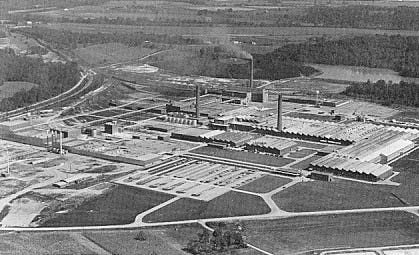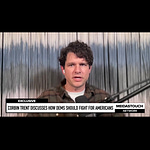I read his piece, Globalization did not hollow out the American middle class, and I kept thinking about my uncle John. He graduated high school, took a job as a bag boy at the local A&P. Union job. Bought a new Camaro. Rented his own apartment. No roommates. Fishing on his days off, partying on the weekend, all on a bag boy’s salary.
This don’t jive with Smith's "50% real wage growth" when that same job today won't even cover rent in a shared apartment.
Smith's fundamental mistake is believing numbers on spreadsheets reflect reality.
Eugene Ludwig served as U.S. Comptroller of the Currency. Washington insider, decades trusting government statistics.
Now he's saying what I've been screaming from East Tennessee: the numbers are bullshit.
Ludwig's team found real unemployment is 23.7% when you count people who can't find full-time work or make poverty wages. Not 4.2%.
The median wage isn't $61,900. It's $52,300 when you include everyone trying to work.
Cost of living for working Americans rose 35% faster than the CPI admits.
RAND Corporation just updated their study. $79 trillion transferred from the bottom 90% to the top 1% since 1975.
Seventy-nine trillion dollars. From people who work for a living to people who own for a living.
My Years of Work analysis shows the same thing.
In 1950, one median income bought a house in 3.7 years. Today, it takes more than 10 years. Nearly tripling the time cost of a median home.
Noah wants you to believe this doesn't matter. That we’re richer than ever.
At 19, I inherited my grandfather's manufacturing business and watched our customers die one by one. I learned then that you can make numbers say anything you want, but you can't make a closed factory produce furniture.
My region used to bustle. I don’t mean way back in the 50’s. Even as a kid, standing at the end of our driveway in Lowland, TN on Enka Highway, waiting for the school bus.
That road went to BASF plant where my Papaw worked. The river of cars heading to and from that plant went on for half an hour. Just endless.
10,000 people worked there. Had its own power generation, its own bank - Lowland Credit Union. Made nylons and fibers for parachutes during the war, then transitioned to domestic production.
Now grass grows through the parking lot cracks. The contaminants leak into the river that used to power it.
Smith celebrates Americans "flooding into higher-skilled professional service jobs."
My grandfather could diagnose an engine by sound and fix it with basic tools. That knowledge created real value.
Today's "knowledge workers" create financial instruments that extract value from people like him.
When Smith cites wage growth, he's using government statistics with hedonic quality adjustments. A $48,000 car counts as "cheaper" than a 1970s model because it has more features. Tell that to someone trying to make the payment.
These adjustments are economic gaslighting. The BLS openly admits they adjust prices down for "quality improvements." Your payment is real. Their discount is imaginary.
Smith argues imports are "only" 4% of GDP, so trade couldn't have hollowed out manufacturing.
Like saying bullets are only 0.001% of body mass, so getting shot can't be that bad.
When my furniture business went under after NAFTA, we didn't just lose sales. We lost the tool and die makers who kept our equipment running. The engineers who understood wood grain optimization. The suppliers who made specialized components. The knowledge that only comes from actually making things.
China now produces 95% of rare earth magnets, dominates solar panels and batteries.
But sure, Noah, tell me again how this is only 4% of GDP.
Smith brags Americans have the highest median disposable income.
In France, that lower income includes healthcare that won't bankrupt you, college without lifelong debt, childcare that doesn't cost more than rent, pensions that actually exist.
In America, that "higher" income gets devoured by $14,570 per person healthcare costs versus ~$5,000 in France, $100,000+ college degrees versus nearly free, $15,000 annual childcare versus subsidized.
We pay individually for what other countries provide collectively.
The smoking gun all three analyses found: productivity and wages decoupled in the 1970s.
Workers kept getting more productive. Owners kept getting richer. The gains stopped flowing to the people doing the work.
In 1950, household debt was $47 billion - 8 weeks of median income. In 2023, $18.2 trillion - 63 weeks of median income.
We went from working 2 months to pay debt to working over a year.
Smith admits China cost 2 million manufacturing jobs but says that's "only 1.5% of the workforce."
Those were the jobs that anchored entire communities. When the plant closes, the restaurants that fed them close. The suppliers that served them close. The tax base that funded schools and roads disappears. Factory closures cost far more than just factory jobs.
I watched it happen in real time. Not in statistics. In obituaries. In foreclosure notices. In kids I went to school with dying from opioids because there was nothing left to do and nowhere left to go.
My uncle John was a fuel pump mechanic. Worked all over East Tennessee, Kentucky, Virginia.
He watched the industry change from things you could repair to things you just replaced. He'd tell me about Reagan busting unions while we fished for bluegill on the lakes. About how coders and programmers weren't going to save us.
He was right. We didn't just lose manufacturing. We lost the ability to solve problems with our hands.
When China restricts rare earth minerals, Smith's "knowledge economy" can't code its way out of it. When we need ventilators in a pandemic, we can't financial engineer them into existence. When the bridges collapse, McKinsey consultants can't PowerPoint them back up.
Smith celebrates we're only 10% manufacturing, as if making things is beneath us.
Every great power in history fell when it stopped building and started shuffling paper. Rome imported Egyptian grain and Chinese silk before it fell. We're importing our antibiotics and our ammunition.
In 2015, I'm sitting on my food truck listening to Bernie Sanders on the radio.
He's describing what I'd witnessed my whole life. The closing of factories. Trade deals that destroyed us. People addicted to opiates. No healthcare. Living in the richest nation in history.
I'd gone from inheriting my grandfather's companies at 19 to watching it die by 25. From culinary school at the CIA to coming home to build food trucks because there was nothing else left to build.
Bernie was the first politician who seemed to see what I saw.
Smith wants you to accept this is evolution. Being dependent on other countries for everything from medicine to microchips is just efficient markets at work.
I'm telling you it's collapse in slow motion. Now even the Washington insiders are admitting it.
We can keep pretending GDP growth means prosperity while people finance groceries on payment plans. We can keep believing "knowledge work" can replace actually making things. We can keep trusting economists who've never held a wrench to explain why the factory closures were good for us.
Or we can admit what's obvious to anyone who's watched their community die:
We traded our ability to build for the ability to borrow. We traded production for consumption. We traded power for comfort.
The numbers lie. The closed plants don't.
Don't believe Smith. Believe your eyes. Believe your grocery bill. Believe your kid's student loans. Believe the empty factories and the full prisons.
We didn't lose our manufacturing. We gave it away.
And all of Smith's charts can't hide what that cost us.
Tell me about your stories in the comments.












